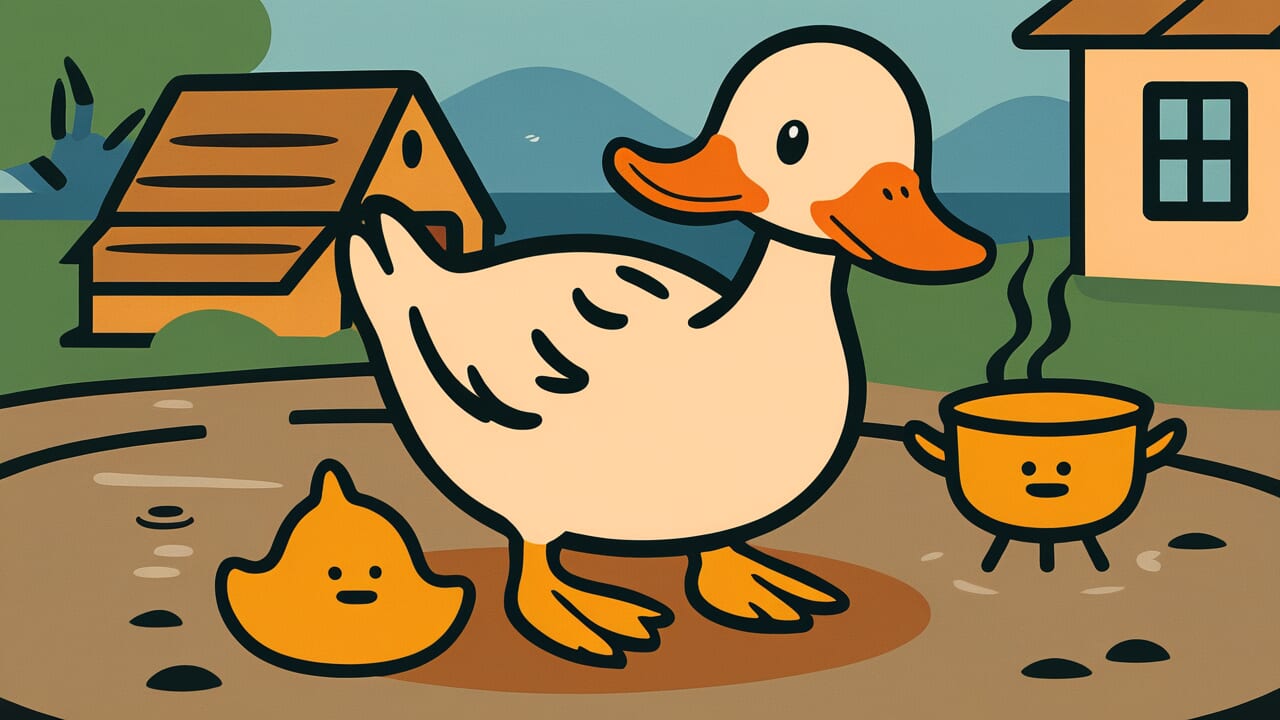How to Read “The neighbor’s poverty tastes like duck”
Tonari no binbō wa kamo no aji
Meaning of “The neighbor’s poverty tastes like duck”
This proverb is a sharp criticism of human psychology. It describes how people sometimes find amusement in others’ misfortune or hardship, especially when it doesn’t affect them directly.
The saying points out an ugly side of human nature. We sometimes enjoy watching people close to us struggle with poverty, as if we’re savoring a delicious duck dish.
People use this proverb to criticize those who take pleasure in others’ misfortune. It also serves as a warning to check our own hearts when we catch ourselves doing the same.
When we’re safe and comfortable, we tend to view others’ failures and difficulties objectively. We might even find them entertaining. This isn’t praiseworthy behavior, but it’s a real part of human nature.
You can see this pattern today on social media. People’s failure stories go viral. Celebrity scandals become entertainment. These modern behaviors reflect the same human tendency this proverb describes.
Origin and Etymology
No clear historical records explain the exact origin of this proverb. However, we can learn a lot by examining how the phrase is constructed.
The key lies in the expression “tastes like duck.” Duck meat has been a prized delicacy in Japan since ancient times. Winter duck hot pot was considered especially delicious.
For common people, duck was a rare treat they could seldom afford. So why did this phrase about delicious duck become connected to “the neighbor’s poverty”?
The answer reveals complex human psychology. When our own life is hard, learning that our neighbor struggles too brings strange comfort. Though we know it’s wrong, we feel some relief.
The proverb compares this feeling to savoring delicious duck. It captures how “flavorful” or satisfying this sensation can feel, even though we shouldn’t enjoy it.
This expression faces the dark side of human nature directly. Yet by wrapping it in food culture language, it adds layers of irony and self-mockery.
The proverb embodies a distinctly Japanese spirit of self-reflection. It acknowledges these feelings exist within us while warning us to guard against them.
Usage Examples
- I was laughing at my coworker’s mistake when my senior reminded me that the neighbor’s poverty tastes like duck
- I caught myself enjoying someone’s misfortune online and thought, this is exactly what the neighbor’s poverty tastes like duck warns against
Universal Wisdom
This proverb has survived because it touches an uncomfortable truth about the human heart. We all want to be good people who feel genuine sympathy for others’ misfortune.
But honestly, when we’re safe and comfortable, we sometimes feel relief or even superiority when viewing others’ failures and difficulties. This is the truth we don’t want to admit.
Why do people have such feelings? Because others’ misfortune highlights our own relative happiness. If our neighbor is poor, our own life doesn’t seem so bad.
When someone fails, our own success shines brighter. This comfort from comparison may be unavoidable, since humans are fundamentally social creatures.
The deep wisdom of this proverb lies in how it handles this dark side. It doesn’t hide or deny these feelings. Instead, it acknowledges them while warning against them.
By using the metaphor of delicious duck, the proverb admits how tempting these feelings are. At the same time, it shows that acting on them is shameful.
Humans aren’t perfect. That’s exactly why we need to watch our own hearts and correct ourselves. This is what our ancestors tried to teach us through this saying.
When AI Hears This
The human brain calculates happiness through differences, not absolute values. Whether someone earning $50,000 feels happy depends entirely on whether those around them earn $30,000 or $70,000.
This is the core of relative deprivation theory. What’s fascinating is that the brain’s reward system activates when comparison targets drop, even when your own situation hasn’t changed at all.
When your neighbor becomes poor, you’ve gained nothing objectively. Yet your brain generates satisfaction as if you’re enjoying a luxury duck meal.
This phenomenon has evolutionary roots. In competition for limited resources, relative advantage mattered more for survival than absolute strength. A hunter catching 10 animals had low status if others caught 15.
But catching only 5 animals meant high status if others caught 3. So human brains evolved to constantly calculate “am I above or below others?”
Behavioral economics experiments reveal something striking. Some people choose receiving $3,000 while others get $1,000 over receiving $5,000 themselves while others get more.
They sacrifice absolute gain to maintain relative advantage. This proverb exposes a structural limitation of the human brain. Our happiness can only be perceived through the filter of comparison.
Lessons for Today
This proverb teaches us the importance of being honest about our own feelings. When you catch yourself finding amusement in someone’s failure or misfortune, don’t deny it.
First, acknowledge it. Having such feelings is natural for humans. There’s no point in pretending you’re above these emotions.
What matters is what you do after noticing these feelings. Will you continue consuming others’ misfortune as entertainment? Or will you pause and recover your sense of empathy?
This choice shapes your character over time. Small decisions about how you respond to these moments define who you become.
This matters especially in the social media age. Every day, we encounter countless pieces of information about other people’s lives.
Before you share someone’s failure story, before you find amusement in someone’s misfortune, stop for a moment. Ask yourself how you’d feel in their position.
This proverb isn’t demanding you become a perfect person. Rather, it’s inviting you to acknowledge your imperfections while gradually choosing kindness more often.
There’s a small voice of conscience inside your heart. Why not take a moment to listen to it?



Comments